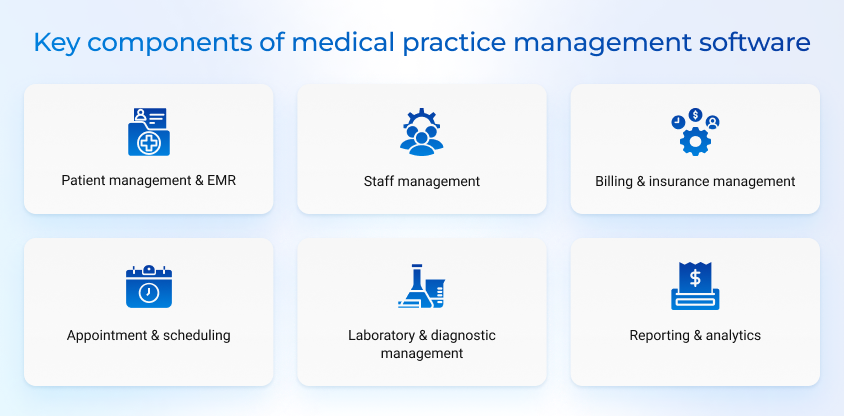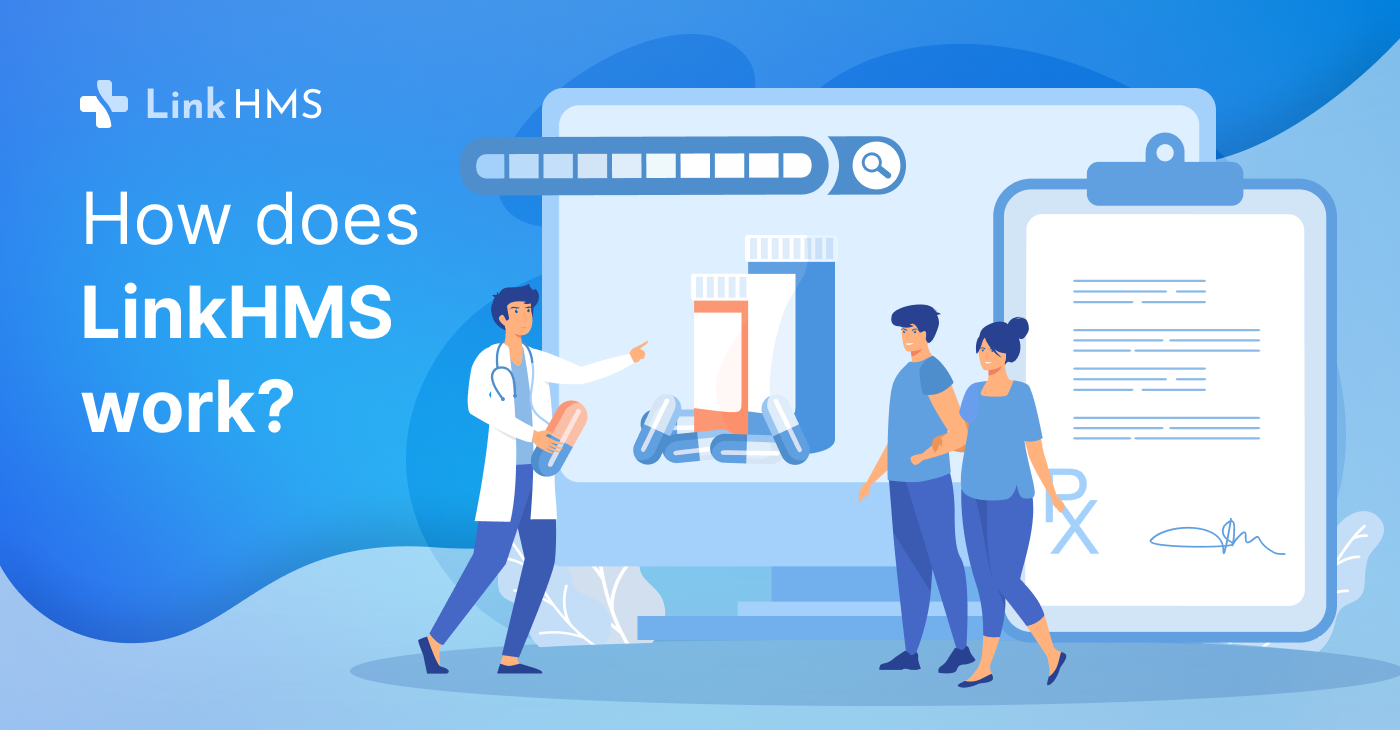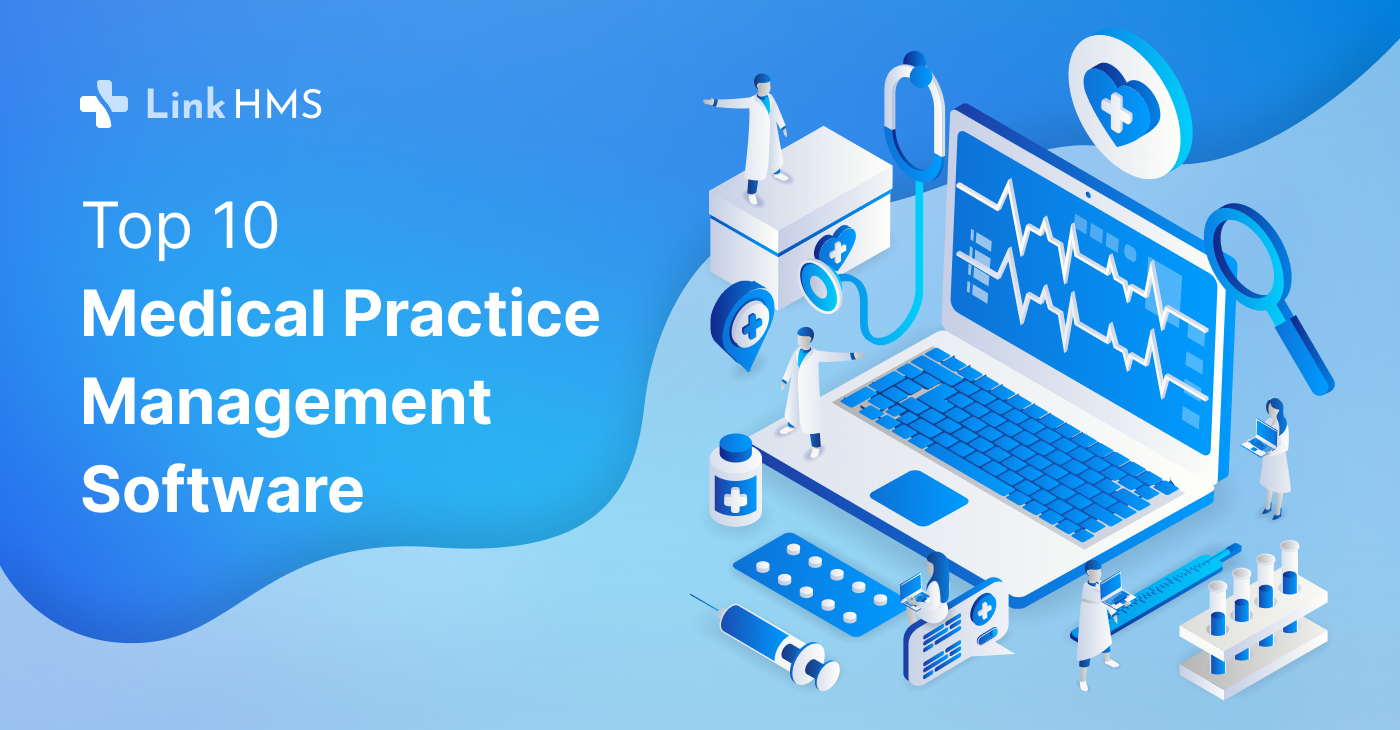
The right practice management solution isn’t just a tool; it’s the backbone of efficiency and exceptional patient care. Let’s explore the top 10 medical practice management software that satisfies the healthcare facilities’ pressing needs.
List of the Content
- Medical practice management software types
- Key components of top medical practice management software
- Top 10 medical practice management software
- Trends in medical practice management
- How to choose the best medical practice management software?
- Conclusion
TYPES OF MEDICAL PRACTICE MANAGEMENT SOFTWARE
The solutions used in medical practices and hospitals could vary in deployment method and customization level. Each type offers some distinct advantages based on healthcare providers’ needs. When you look for medical practice management software, you need to understand the difference between available types and their specifications.
On-premise medical practice management software
- Installed and operated on local servers within the healthcare facility.
- Provides complete control over data security, compliance, and system configurations.
- Requires significant upfront investment in infrastructure, IT staff, and maintenance.
- Best suited for large hospitals or institutions with strict regulatory and security requirements.
Cloud-based medical practice management software
- Hosted on remote servers and accessed via the internet.
- Eliminates the need for on-site infrastructure, reducing maintenance costs.
- Offers real-time data accessibility from any location, improving operational efficiency.
- Ensures automatic updates and scalability, making it a preferred choice for all-sized healthcare facilities.
Both on-premise and cloud-based medical practice management software have advantages. Cloud-based software is generally better due to its accessibility, scalability, lower upfront costs, and automatic updates. At the same time, on-premise solutions offer more control and security but require higher maintenance and infrastructure costs. The right choice depends on budget, scalability, data security, and the healthcare facility’s operational needs.
KEY COMPONENTS OF TOP MEDICAL PRACTICE MANAGEMENT SOFTWARE
The feature-rich software combines all the necessary components to deliver smooth, end-to-end medical practice management. It commonly embraces medical operations and administrative workflows. Hospital management systems’ key functionalities are built around core components that medical practices rely on and want to optimize.
Patient management & Electronic Medical Records (EMR)
- Centralized patient records for medical history, diagnoses, treatments, and prescriptions.
- Appointment scheduling and live queue management to minimize patient wait times.
- Digital documentation and automation of patient interactions.
Appointment & scheduling module
- Simplifies booking, rescheduling, and cancellations for patients and healthcare providers.
- Integration with doctors’ calendars and availability tracking.
- Automated reminders and follow-up scheduling.
Staff management
- Manages doctor and staff schedules.
- Tracks performance and productivity for operational efficiency.
- Enhances coordination between departments.
Laboratory & diagnostic management
- Allows doctors to request lab tests and receive results directly within the system.
- Tracks sample collection, processing, and reporting in real-time.
- Reduces errors in manual data entry and improves collaboration between departments.
Billing & insurance management
- Improves financial transactions, including patient billing, invoicing, and payment processing.
- Supports multiple payment methods and integrates with insurance claims processing.
- Ensures compliance with medical billing standards.
Reporting & analytics
- Provides real-time insights into hospital performance, revenue, and patient care quality.
- Generates compliance reports.
- Supports data-driven decision-making for hospital administrators.
Healthcare facilities seek functional, high-quality solutions to improve operational efficiency and expand the patient experience through flexible, transparent, and faster processes.
TOP 10 MEDICAL PRACTICE MANAGEMENT SOFTWARE
Managing a medical practice efficiently requires robust software that improves administrative and clinical workflows, ensuring improved patient care, seamless scheduling, and effective billing. Here’s a look at the top 10 medical practice management software solutions that are revolutionizing healthcare operations.
1. LinkHMS
LinkHMS is an advanced hospital and clinic management system designed for healthcare facilities of all sizes. With its user-friendly interface and powerful features, LinkHMS simplifies appointment scheduling, electronic medical records (EMR) management, billing, and reporting. As a SaaS-based solution, it offers quick implementation and a seamless onboarding process.
Type: Hospital and Clinic Management Software
Key Features:
- EMR integration for efficient patient data management
- Automated appointment scheduling and live queue system
- Billing and invoicing capabilities
- Secure patient data through compliance with global healthcare standards
Benefits:
- Easy-to-use interface requiring minimal training
- Quick setup and deployment with SaaS flexibility
- Scalable for small clinics and large hospitals
- Cost-effective solution with subscription-based pricing
Free Trial: Offers a free 14-day trial with quick onboarding.
LinkHMS pricing:
| One plan to fit clinics of all sizes |
|
$29/month – 1 admin user $7/month per additional user |
2. AdvancedMD
AdvancedMD provides a comprehensive suite of medical practice management solutions, including scheduling, billing, and patient engagement tools. Designed for independent practices and medical groups, it offers cloud-based accessibility for seamless operations.
Type: Cloud-Based Practice Management Software
Key Features:
- Integrated EHR and practice management
- Telemedicine support
- Customizable reporting and analytics
- Claims management and revenue cycle optimization
Benefits:
- Strong integration with other healthcare tools
- Robust automation reduces manual work
- High security for patient data
- Flexible pricing options for different practice sizes
Free Trial: Demo available; no standard free trial
Pricing: upon request
3. NextGen Healthcare
NextGen Healthcare is a highly scalable solution that caters to small practices and large healthcare organizations. It emphasizes interoperability, making it easier to integrate with various healthcare systems.
Type: EHR and Practice Management Software
Key Features:
- Comprehensive EHR and PM integration
- Telehealth solutions
- Patient portal for enhanced engagement
- Automated billing and claim management
Benefits:
- User-friendly patient portal enhances communication
- Reduces administrative burden with automation
- Seamless third-party integrations
- Customizable workflows for different specialties
Free Trial: Demo available; no standard free trial
Pricing: upon request
4. Athenahealth
Athenahealth is a cloud-based medical practice management software known for its extensive interoperability and automation capabilities. It simplifies administrative processes while improving patient engagement.
Type: Cloud-based EHR and Practice Management Software
Key Features:
- AI-powered revenue cycle management
- Cloud-based EHR and telehealth solutions
- Population health management
- Customizable reporting and analytics
Benefits:
- Real-time insights for data-driven decision-making
- Improves cash flow with automated billing
- Reduces documentation time for clinicians
- Scalable for growing healthcare facilities
Free Trial: Typically offers a demo; free trial availability varies
Pricing: upon request
5. Medesk
Medesk is a cloud-based practice management software designed for small to mid-sized medical practices. It provides a range of tools to improve administrative efficiency, patient engagement, and clinical workflows.
Type: Cloud-Based Practice Management Software
Key Features:
- Online appointment scheduling and automated reminders
- Electronic health records (EHR) with customizable templates
- Billing and invoicing system with financial analytics
- Telemedicine support for remote consultations
- Integrated patient portal for better communication
Advantages:
- User-friendly interface with intuitive navigation
- Customizable features to suit different medical specialties
- Strong data analytics and reporting tools
- Secure cloud storage with compliance with healthcare regulations
Free Trial: Offers a free trial for new users.
Pricing: $5/month for 50 appointments, $8/month for 100 appointments, and premium plans with custom pricing.
6. DrChrono
DrChrono is a mobile-friendly medical practice management solution that is ideal for on-the-go healthcare professionals. It provides seamless integration with Apple devices and ensures efficient patient care.
Type: Mobile EHR and Practice Management Software
Key Features:
- Mobile EHR with iPad and iPhone compatibility
- Online patient check-in and scheduling
- ePrescribing and lab integrations
- Billing and revenue cycle management
Benefits:
- Optimized for mobile use with Apple devices
- Fast and easy patient check-in process
- User-friendly interface for clinicians
- Automated billing features reduce paperwork
Free Trial: Offers a free trial for new users.
Pricing: upon request
7. Noterro
Noterro is a medical practice management software tailored for allied health professionals such as physiotherapists and chiropractors. It simplifies appointment scheduling, documentation, and billing.
Type: Allied Health Practice Management Software
Key Features:
- SOAP notes and customizable charting
- Integrated online booking system
- Secure patient data storage
- Billing and payment processing
Benefits:
- Ideal for specialized healthcare providers
- Simplifies patient documentation
- Secure and encrypted data storage
- Efficient online booking reduces administrative workload
Free Trial: Provides a free trial.
Pricing:
| Core plan | Plus plan | Max plan |
|
$30/month $12/month per additional user |
$50/month $20/month per additional user |
$70/month $25/month per additional user |
8. Zanda Health
Zanda Health is a flexible and scalable practice management software that supports various healthcare providers. It offers a robust suite of features for optimizing operations and patient care.
Type: EHR and Practice Management Software
Key Features:
- EHR and practice management integration
- Telemedicine solutions
- Secure patient communication tools
- Revenue cycle management
Benefits:
- Customizable workflows to fit different specialties
- Enhances patient communication and engagement
- Reduces administrative burden with automation
- Scalable for clinics of all sizes
Free Trial: Not publicly available
Pricing:
| Starter plan | Growth plan |
|
$19/month – 1 practitioner |
$49/month – 1 practitioner $19/month – 1 additional practitioner |
9. Tebra
Tebra is a comprehensive cloud-based practice management solution that helps healthcare providers optimize patient care, enhance administrative efficiency, and improve financial performance.
Type: Cloud-Based Practice Management Software
Key Features:
- Online scheduling and automated reminders
- Billing and revenue management tools
- Telehealth support
- Secure messaging for patient communication
Benefits:
- Advances patient scheduling and communication
- Enhances revenue cycle management with automation
- Cloud-based access for remote management
- Scalable for small to large practices
Free Trial: Typically offers a free trial
Pricing: upon request
10. Practice Fusion
Practice Fusion is a cloud-based EHR and practice management software tailored for small to mid-sized medical practices. It offers an affordable and user-friendly solution for improving healthcare operations.
Type: Cloud-based EHR and Practice Management Software
Key Features:
- Integrated EHR and practice management
- ePrescribing and lab integration
- Customizable charting
- Secure patient messaging and portal
Benefits:
- Affordable and easy to implement
- Enhances workflow efficiency
- Supports regulatory compliance
- Improves patient engagement
Free Trial: 14-day free trial
Pricing: $199/month per provider with a required annual commitment
TRENDS IN MEDICAL PRACTICE MANAGEMENT: WHAT TO FOLLOW?
Due to lots of changing conditions in the healthcare industry, hospitals and practices need to stay ahead by adopting the latest trends. Current tendencies focus on shaping the future of hospital management with new technologies and practical approaches.
Latest development approaches
HMS providers invest a lot in software development. With the increasing demand for scalable and efficient hospital management solutions, they shift toward the following trends.
- SaaS-based software – Cloud-based, subscription-based models offer hospitals practice management systems with minimal upfront investment and scalable infrastructure.
- Flexible architecture – Modular development allows different HMS components (billing, patient records, lab reports) to operate independently for better performance and scalability.
- Personalization – Providers make it possible to customize workflows without extensive technical expertise and with fast adaptation.
IoT and wearables in healthcare
These technologies improve medical practice management by connecting smart devices and enabling continuous health, operations, and asset tracking.
- Remote patient monitoring – Wearable and IoT devices track heart rate, oxygen levels, and glucose levels, transmitting data to EHR in real time.
- Smart scheduling & workflow optimization –It is used to track patient flow, optimize appointment scheduling, and reduce wait times.
- Inventory and asset tracking – It works great for monitoring medical supplies, medication stock levels, and medical equipment.
AI in healthcare and automation
Medical practices emphasize varying successful use cases of AI to improve accuracy, and patient experience and simplify the staff workload.
- AI-powered diagnostics – The adoption of AI analyzes medical images, lab reports, and patient history for faster and more accurate diagnoses.
- Chatbots and virtual assistants – They can automate appointment scheduling, answer patient queries, and assist medical staff in administrative tasks.
- Predictive analytics – AI analyzes patient data to identify trends, prevent readmissions, and optimize hospital resources.
Varying integrations
Exceptional medical practice management depends on enhanced integrations with additional tech solutions.
- Electronic Health Records (EHR) – It ensures comprehensive patient data access across different healthcare providers.
- Insurance and billing systems – This integration automates claims processing, reduces manual errors, and improves reimbursement cycles.
- Telemedicine platforms – They work efficiently to facilitate remote consultations, digital prescriptions, and patient follow-ups.
Patient-centric solutions
This tendency signifies new approaches to increase loyalty and strengthen patient-doctor relationships.
- Personalized treatment plans – AI-driven solutions suggest tailored healthcare plans based on medical history and lifestyle data.
- Self-service portals – Patients can access medical records, schedule appointments, and pay bills online.
- Mobile applications – The fusion of mobile technologies showcases the significant potential of apps for better patient engagement.
HOW TO CHOOSE THE BEST MEDICAL PRACTICE MANAGEMENT SOFTWARE?
It is referred to as one of the critical decisions for any healthcare facility. The top medical practice management software should enhance operational efficiency, improve patient care, and ensure compliance with industry regulations. Below are some of the key factors hospitals should consider when selecting their system.
Software features: Hospitals should evaluate whether medical practice management software includes the required set of modules with functionality for EHR, scheduling, lab integration, reporting, etc.
Security and compliance: Data protection is a top priority in healthcare. The chosen software has to comply with all the regional and international regulations (HIPAA, GDPR, etc.). It’s important that the system has end-to-end encryption, role-based access control and regular security updates.
Pricing and cost considerations: Healthcare facilities always balance cost and value when choosing their best medical practice management software. They need to take into account such expenses as upfront costs, subscription pricing, scalability fees, support costs, etc.
Ability to extend: Top medical software should be adaptable to future needs and integrate with existing hospital needs. As the hospital grows or adds new departments, it should support the ability to extend.
Ease of use: It’s easier to use medical practice management software that has an intuitive interface, smooth performance and great accessibility. It can reduce learning curves for medical staff and guarantee staff productivity.
Vendor reputation and support: It’s recommended to research vendors, including case studies with customer reviews. Top medical practice management software provides continuous improvements and 24/7 technical support availability.
The right choice should always align with your practice needs, budget, and future growth plans. A well-selected system ensures efficiency, security, and improved patient care, making it a valuable investment for any healthcare facility. Many providers offer free trials or demos, allowing healthcare professionals to evaluate the software before making a commitment.
Would you like to try LinkHMS?
We offer a 14-day trial period to experience the hospital management system functionality in your hospital environment.
CONCLUSION
By adopting the right practice management software, medical organizations can enhance efficiency, reduce administrative burden, and ultimately provide better patient care. Top medical software offers unique features tailored to different practice sizes and specialties—whether for small clinics, large hospitals, or specialized healthcare providers.
FAQs
What is medical practice management software?
Medical practice management software helps healthcare facilities manage administrative and clinical tasks. It includes appointment scheduling, billing, patient records, reporting, etc.
What are the benefits of cloud medical practice management software?
Cloud-based software supports remote access, automatic updates, and enhanced security. It also eliminates the need for on-premises servers, thus reducing IT maintenance costs. Cloud solutions offer better scalability and real-time data sharing among healthcare teams.
How do you choose your practice management software for the medical facility?
When selecting your solution, consider factors such as the size of your practice, required features, ease of use, scalability, security compliance, and customer support.
Do medical practice management systems offer free trials?
Software providers usually offer free trials or demos to allow healthcare providers to explore features before committing. Therefore, the duration and availability of free trials vary by provider.
